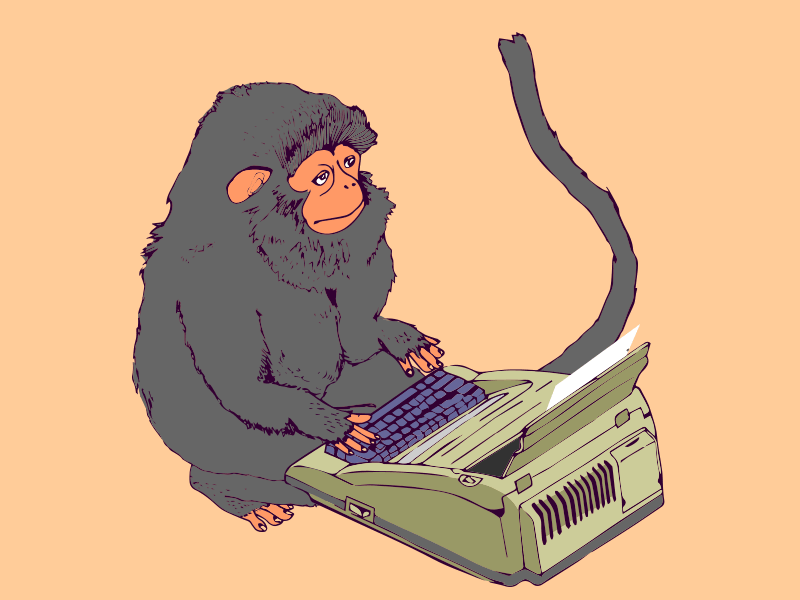Not Enough Monkeys
Given room enough and time,
monkeys enough and typewriters,
my work can be woven without me.
There is not time enough,
the room’s too small.
It falls upon me,
whenever time
whatever room,
I must do it myself
or what use will I be?

Monkey on Typewriter -- Amanda Cassingham-Bardwell
Given room enough and time,
monkeys enough and typewriters,
my work can be woven without me.
There is not time enough,
the room’s too small.
It falls upon me,
whenever time
whatever room,
I must do it myself
or what use will I be?

Monkey on Typewriter -- Amanda Cassingham-Bardwell
In 1913 French mathematician Émile Borel introduced the notion that an infinite number of monkeys on typewriters could produce Shakespeare’s "Hamlet" in his essay essay "Mécanique Statistique et Irréversibilité.” He repeated the claim in his book "Le Hasard" in 1914. In 1928 British physicist Arthur Eddington developed the metaphor further in "The Nature of the Physical World": "If an army of monkeys were strumming on typewriters they might write all the books in the British Museum." However, even though "the chance of their doing so is decidedly more favourable than the chance of the molecules returning to one half of the vessel" the probability was still functionally equivalent to being impossible. But in 1938 R. G. Collingwood, the British art philosopher, argued in "The Principles of Art" that art cannot be produced by accident and
ReplyDeletedismissed the notion that "the 'works' of Shakespeare" can be identified "with the series of letters printed on the pages of a book."
The notion also began to affect the literary sensibilities of the Argentinian writer Jorge Luis Borges. In 1939 his short story "Pierre Menard, autor del Quijote" (Pierre Menard, Author of the Quixote) appeared in the journal "Sur." Disguised as a review of a fictional French writer, it described Menard's efforts to "re-create" rather than "translate" Miguel de Cervantes Saavedra's great 17th-century novel by reproducing it word for word but richer in allusion because it must be considered in light of world events since its original composition. Simultaneously, Borges produced the essay "La Biblioteca total" (The Total Library) in which he traced the infinite-monkey concept back to Aristotle's "Metaphysics" (while Leucippus had held that the world arose through the random combination of atoms, Aristotle noted that the atoms themselves are homogeneous, and their possible arrangements differ only in shape, position and ordering) and "On Generation and Corruption" (Aristotle claimed that, similarly, tragedies and comedies differ though they too consist of the same "atoms" -- alphabetic characters). Three centuries later in "De natura deorum" (On the Nature of the Gods) the Roman philosopher Marcus Tullius Cicero took the opposite view ("He who believes this may as well believe that if a great quantity of the one-and-twenty letters ... were thrown upon the ground, they would fall into such order as legibly to form the 'Annals of Ennius.' I doubt whether fortune could make a single verse of them.") And then Borges followed the argument through Blaise Pascal and Jonathan Swift before describing the contents of the Total Library: "Everything would be in its blind volumes. Everything: the detailed history of the future, Aeschylus' [no longer extant] "The Egyptians," the exact number of times that the waters of the Ganges have reflected the flight of a falcon, the secret and true nature of Rome, the encyclopedia Novalis would have constructed, my dreams and half-dreams at dawn on August 14, 1934, the proof of Pierre Fermat's theorem, the unwritten chapters of [Charles Dickens' unfinished novel] "Edwin Drood," those same chapters translated into the language spoken by the Garamantes (a North African tribe described by Herodotus], the paradoxes [George] Berkeley invented concerning Time but didn't publish, [William Blake's mythical embodiment of law and conventional reason] Urizen's books of iron, the premature epiphanies of [James Joyce's alter ego in "A Portrait of the Artist as a Young Man"] Stephen Dedalus, which would be meaningless before a cycle of a thousand years, the Gnostic Gospel of Basilides, the song the sirens sang, the complete catalog of the Library, the proof of the inaccuracy of that catalog. Everything: but for every sensible line or accurate fact there would be millions of meaningless cacophonies, verbal farragoes, and babblings. Everything: but all the generations of mankind could pass before the dizzying shelves — shelves that obliterate the day and on which chaos lies — ever reward them with a tolerable page." He also noted Kurd Lasswitz's 1901 story "Die Universalbibliothek" (The Universal Library) in which he posited that the recombinations and repetitions of 25 symbols (22 letters, the space, the period, and the comma) encompass everything possible to express in all languages. The totality of such variations would form a Total Library of astronomical size, which Lasswitz championed because it would rely entirely by chance rather than intelligence. Borges then developed the ideas further in another short story "La biblioteca de Babel" (The Library of Babel, 1941), in which he reflected on how the means of reproduction impoverishes a text; since complete randomness would eventually reproduce all possible combinations of letters, any work with meaning is random and therefore meaningless.
ReplyDeleteVarious computerized "monkeys" have been programmed to test the implications, but in 2003 the University of Plymouth put a computer keyboard with 6 Celebes crested macaques for 1 month. The monkeys only produced 5 pages of text (consisting mainly of the letter S), and (in frustration?) the alpha male began bashing the keyboard with a stone, and the other monkeys defecated and urinated on it.
ReplyDelete